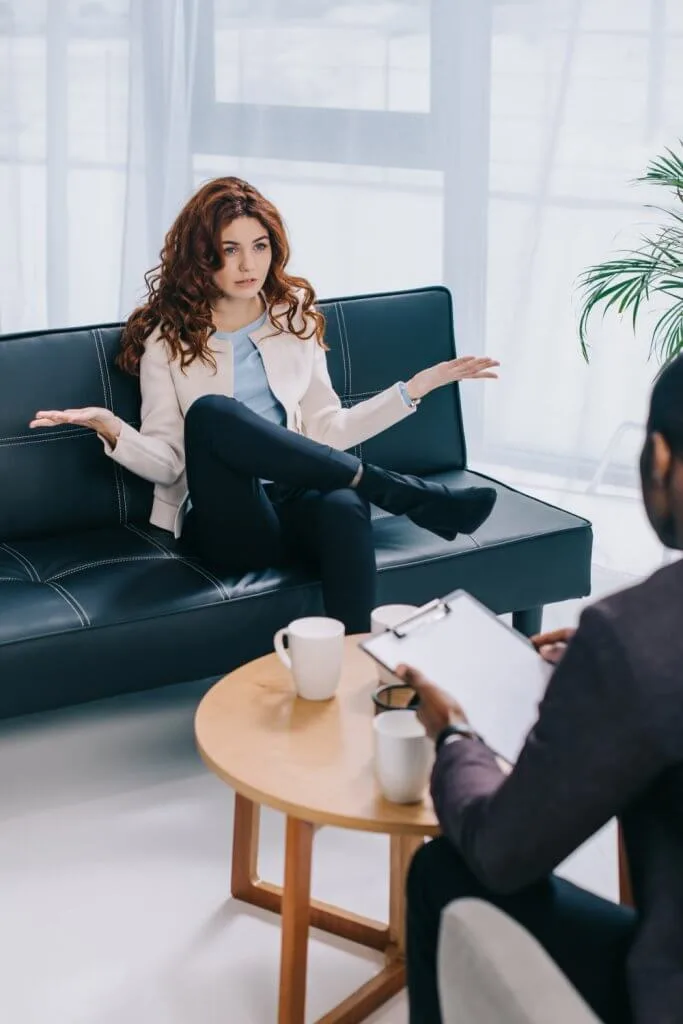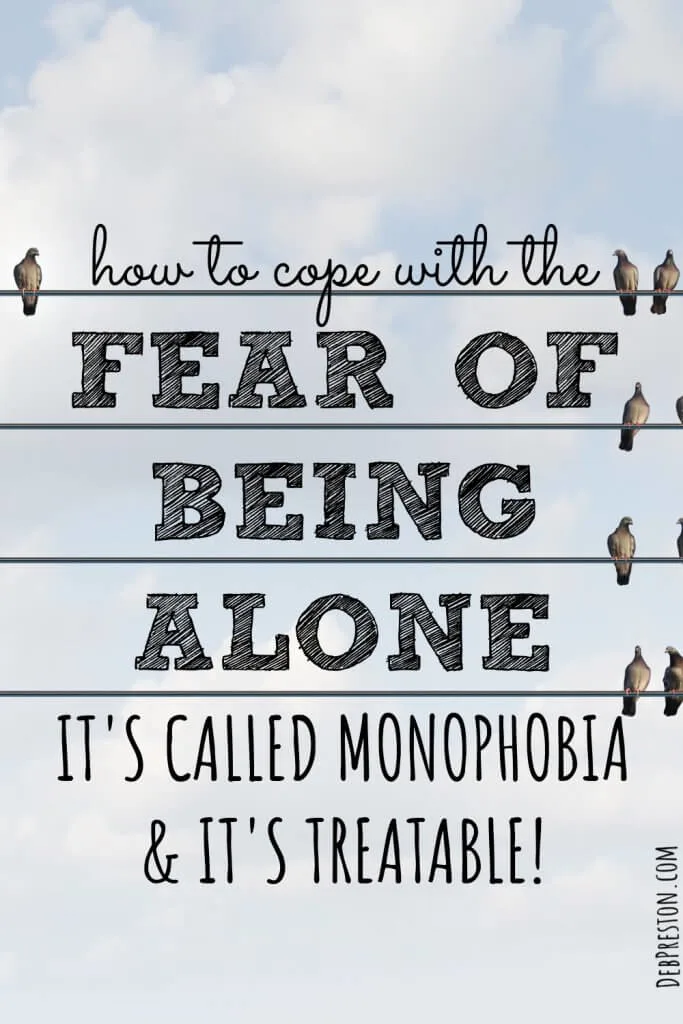I’ll always remember moving into my first apartment. After spending 17 years living with my family and 4 more years in a college dorm, I encountered an intense fear of being alone at a time I had hoped to enjoy some quality “me time.”
I had to have music or the tv playing at all times – even while I slept or was away at work. And I often struggled to find the right lighting – bright enough to help me feel safe at night yet dim enough to allow for sleep.
I checked every closet, under the bed, and even inside my kitchen cabinets every time I returned home, juuuuust in case a murderer was hiding there. (Yet somehow, those checks never made me feel much better.)
I constantly went out with friends, invited them over, and the second they left, picked up the phone to call more friends and family members. But it was never enough to fill the heavy void inside my chest in my inevitable hours spent alone.
I knew it made no sense! I lived in a safe neighborhood, with my college friends a five-minute drive away. Heck, my boyfriend lived in the same apartment complex just two buildings over!
Yet, I struggled to find any semblance of peace when I was alone. The fear of being alone overwhelmed and beat me down on a daily basis.
I thought I was the only one who must be struggling with something so silly, something I knew was irrational yet couldn’t control. But it turns out the fear of being alone is a very common human experience.
What is the fear of being alone? Do I have monophobia?
Believe it or not, the fear of being alone has a medical name – monophobia or sometimes, autophobia. WebMD defines it as, “the fear of being isolated, lonely, or alone.”
When you think of the fear of being alone, you likely think of a very specific situation such as the fear of living alone or going to public places alone. However, the fear of being alone can manifest itself in a variety of ways, including:
- Fear of living alone
- Fear of being home alone
- Fear of being alone in the dark
- Fear of being alone at night
- Fear of being alone over holidays
- Fear of being alone in public
- Fear of facing a dangerous situation alone
- Fear of being apart from one particular person
- Fear of being alone after a breakup
- Fear of feeling alone or lonely
- Fear of being alone forever (in regards to relationships)

What are the symptoms of monophobia? Do I have autophobia?
The fear of being alone may result in both psychological and physical symptoms, including but not limited to:
- Unreasonable or excessive fear
- Instant anxiety response that is disproportionate to the situation
- Recognition that the fear is unreasonable, yet still an inability to control it
- Intrusive fears of strangers, intruders, noises, or other potential dangers
- Avoidance of being alone whenever possible, even when it’s inconvenient or illogical
- Extreme distress when alone
- Constant fear of being harmed
- Sense of impending doom
- Fear that impacts your ability to perform normal, day-to-day routines
- Excessive fear that has lasted for longer than six months
- Fear that impacts your family and social relationships
- Constant fear of abandonment, especially in the face of contrary circumstances
- Nagging thoughts about being unloved, unliked, or unwanted, especially in the face of contrary circumstances
- Nagging thoughts of aging and/or dying alone
- Accepting abuse and unhealthy relationships for fear of losing those relationships and being alone
- Constantly filling empty space with TV, social media, or other background noise/distractions
- Trouble focusing or thinking clearly
- Disorientation
- Shaking or trembling
- Dry mouth
- Ear ringing
- Sweating
- Nausea
- Dizziness or fainting
- Increased heart rate
- Chest pain or tightness
- Shortness of breath and/or a sense of choking
- Panic attacks
How is the fear of being alone different from regular loneliness?
Loneliness is a regular and expected human experience that will crop up from time to time. In contrast, monophobia results in an excessive fear and often, an instant anxiety response that is disproportionate to the situation at hand.
It often impacts your ability to perform normal, day-to-day routines like going to work or sleeping through the night.
What’s the difference between the fear of being alone and separation anxiety?
The fear of being alone (monophobia) and separation anxiety are quite similar.
Separation anxiety stems from the fear of experiencing physical separation from someone with whom an individual has a significant emotional attachment. It is most often seen in children anxious to be away from their parents, but is also commonly experienced by adults.
The (very slight) difference is that separation anxiety is focused more on the fear of being away from a particular person while monophobia is focused more on the fear itself. Someone with monophobia worries less about the loved one being away and more about the emotions and hardships they expect to experience during that period.
Why do I fear being alone? What are the causes of monophobia?
There are a multitude of reasons you may experience a fear of being alone. Your monophobia may be triggered by one or several of the causes below.
Biological roots
Neurotransmitters in your brain may be misfiring in proportion to the situation at hand.
Family history
Your family history may genetically predispose you to monophobia or anxiety. You can also learn the behavior from parents or other family members.
Unprocessed trauma
A previous, anxiety-inducing experience while being alone may lead to a chronic fear of being alone.
Unprocessed insecure attachment
You may have grown up learning that when people aren’t with you, it’s because they don’t love you. While you may know this to be untrue in your head as an adult, your heart doesn’t always follow suit.
Excessive screen time
Many studies suggest that excessive screen time, especially that spent on social media, may be linked to difficulty or even an inability to be alone.
Related conditions
Psychological conditions such as generalized anxiety disorder, post-traumatic stress disorder (PTSD), social anxiety disorder, codependency, agoraphobia, and more may help contribute to the development of monophobia.

How is autophobia diagnosed?
A medical professional can assist in the diagnosis of autophobia/monophobia. They will often do this by discussing your medical and family history, symptoms, and the specific situations that trigger your fear of being alone.
They might utilize a behavioral avoidance test, which helps to measure the intensity of your fear and/or avoidance.
Once they’ve provided a diagnosis, they can help you to explore the treatment options best suited for your particular situation.
What options are available for treating monophobia? How to Overcome Fear of Being Alone
Medical treatment options range from a variety of therapies to medications.
Cognitive-Behavioral Therapy
This therapy helps individuals to identify their problems and triggers, as well as explore and challenge the thoughts and emotions they’ve attached to those situations. It also offers practical solutions to improve patients’ state of mind and quality of life.
Group Therapy
Group therapy can offer a helpful tool in both normalizing monophobia and offering individuals emotional support and practical solutions from others working through the same diagnosis.
Exposure Therapy/Systematic Desensitization
This form of therapy creates a safe environment within which psychologists “expose” individuals to the things they fear and avoid, in this case, being alone.
It has been scientifically proven to reduce fear for those with monophobia, panic disorder, post-traumatic stress disorder (PTSD), and more. This therapy can also be approached via virtual reality!
Eye Movement Desensitization and Reprocessing (EMDR)
The American Psychological Association explains that, “Unlike other treatments that focus on directly altering the emotions, thoughts, and responses resulting from traumatic experiences, EMDR therapy focuses directly on the memory, and is intended to change the way that the memory is stored in the brain, thus reducing and eliminating the problematic symptoms.”
While EMDR was designed to help people with PTSD overcome the distress of their traumatic memories, it has also proven effective in helping treat phobia symptoms.
Medications
Doctors may also prescribe medication to assist in the healing process. These might include:
- Beta blockers, to reduce the effect of adrenaline in the body.
- Antidepressants, like selective serotonin reuptake inhibitors (SSRIs) or selective serotonin-norepinephrine reuptake inhibitors (SNRIs).
- Sedatives like Benzodiazepine, to minimize the amount of anxiety you feel. (Use these with caution due to the possibility of addiction.)
*These medications should be prescribed and taken as directed by your doctor.
Coping With the Fear of Being Alone – How do I get over my fear of being alone?
There are lots of practical actions you can take to help supplement medical diagnosis and treatment!
- Deep breathing exercises
- Progressive muscle relaxation
- Visualization
- Meditation
- Daily positive affirmations
- Mindful optimism
- Journaling
- Self-soothing habits, like listening to music or taking a bath
- Habits or hobbies that bring you joy
- Online support groups
- Daily time outside
- Daily exercise
- Yoga
- Balanced diet
- Reducing or eliminating caffeine
- Reducing or eliminating alcohol
What’s the outlook for autophobia?
Like many phobias, autophobia/monophobia may resolve itself over time. Some people experience monophobia symptoms in one phase of their life that seem to dissipate when they move to the next phase.
However, others may struggle with monophobia their entire life. That’s why it’s important to seek help from a medical professional who may be able to treat symptoms with therapy, medication, or both.
Thankfully, studies have found that monophobia can be made more manageable and often cured altogether with the help of a medical professional. Your chances of recovery are very good with the right treatment!

I struggled with the fear of being alone for about a year. It eventually resolved itself but would crop back up from time to time, leaving me to squash it down again.
Today, I’ve learned to appreciate time alone as a precious gift, probably because I don’t get as much of it as I used to! In fact, I recently spent two days and nights on a secluded ranch all by myself. I wrote to my heart’s content, enjoyed a glass of wine on the porch, and slept like a baby despite a creepy “blood moon” in the sky that weekend.
And friend, if I can do it? You can do it too!
If you’re struggling with the fear of being alone, please rest assured that you are not, in fact, alone! This condition is much more common than you might expect and has a positive prognosis with proper medical treatment.
What has helped you to manage your fear of being alone? Please be sure to share in the comments!
*Please do not use this article as a substitute for professional advice, diagnosis, medical treatment, or therapy. Always seek the advice of your physician or qualified mental health provider with any questions you may have regarding any mental health symptom or medical condition. Never disregard professional psychological or medical advice nor delay in seeking professional advice or treatment because of something you have read on DebPreston.com.

P.S. How does God fit into all of this? Peace in the Valley is refreshingly honest, down-to-earth, and speaks to the heart of the matter – how can we reconcile our trials with our faith? Check it out here.
Disclosure: While all opinions are our own, we are a participant in the Amazon Services LLC Associates Program and other affiliate advertising programs, designed to provide a means for us to earn fees by linking to Amazon.com and affiliated sites, at no additional cost to you.



